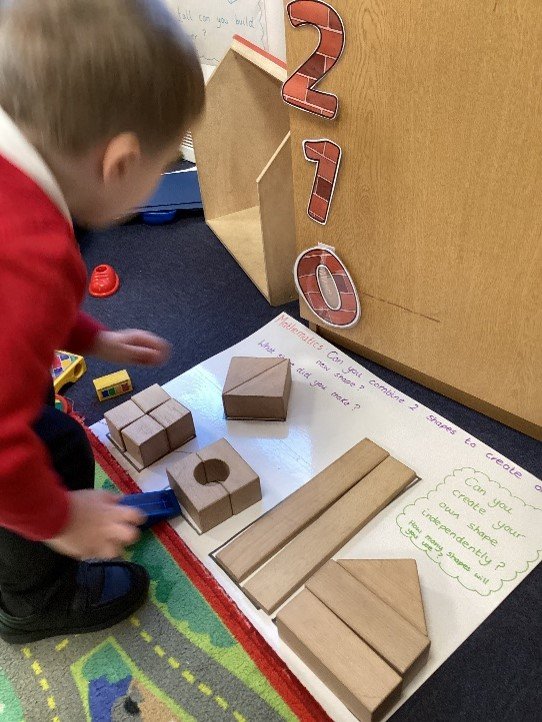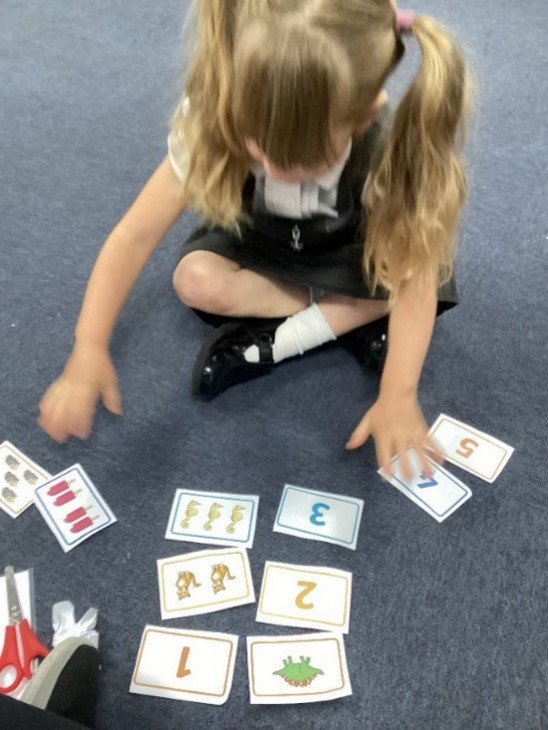
Maths
‘Our names are Mrs Kennedy and Miss Black- we are the Subject Leads for Mathematics in Key Stage 1 and Key Stage 2. As a core subject, we want to provide a high-quality education that inspires pupils to develop a love of maths. We are passionate about the subject and making our children confident to become mathematicians.’
Intent
The intent of the Maths curriculum in Bidston Village CE Primary School is to provide a high-quality education that inspires pupils to develop a love of Maths, leading to mastery of the curriculum and the ability to apply mathematical skills confidently in everyday life.
We follow the White Rose maths scheme, developing fluency and reasoning and problem solving. New mathematical concepts are introduced using a ‘Concrete, Pictorial and Abstract’ approach. This enables all children to experience hands-on learning when exploring mathematical topics. Additional retrieval is practised 2-3 times per week to ensure that mathematical knowledge and vocabulary is embedded and children can recall this information when needed.
We aim for pupils to:
become fluent in the fundamentals of mathematics so that they develop conceptual understanding and the ability to recall and apply knowledge rapidly and accurately.
be able to solve problems by applying their mathematics in a variety of real life scenarios.
reason mathematically by following a line of enquiry and develop and present a justification, argument or proof using mathematical language.
have an appreciation of number and number operations, which enables mental calculations and written procedures to be performed efficiently, fluently and accurately.
Implementation
The Maths curriculum at Bidston CE Primary School is well-planned, sequenced, and taught with clarity and enthusiasm to create a learning environment that is both challenging and supportive. Teachers use a wide range of teaching strategies, including active and collaborative learning, and they provide frequent opportunities for pupils to practice, discuss, and deepen their understanding. Throughout the curriculum, there is a focus on developing fluency, reasoning, and problem-solving skills, with regular formative assessment to check pupils' progress and identify where additional support is required. Mathematical key vocabulary and language are developed through the use of sentence stems during blocks of learning. We follow the Oracy project in our school.
· Maths in EYFS is taught daily through play using the Development Matters Non-Statutory guidance for the Early Years Foundation Stage (EYFS). Teachers use a whole class floor book of evidence and individual learning journals to document their journey in maths. They have an additional Mastering Number session which aims to secure firm foundations in the development of good number sense.
In Key Stage 1 and 2 Maths is taught daily using White Rose Small Steps Progression Scheme of Work to break learning down into small coherent steps with an integrated approach to fluency, reasoning and problem solving.
· Alongside mathematics sessions, an additional 10 minutes 2-3 times a week is spent practising Maths Dictionary (focussing on number fluency, counting skills, mathematical vocabulary, number facts, geometry and measure) to build recall and fluency in these areas.
A range of reasoning resources are used to challenge all children and give them the opportunity to reason with their understanding.
Weekly Interventions are put in place using First Class @ Number in KS1 and Number Stacks in KS2 and booster groups.
Lessons use a Concrete, Pictorial and Abstract approach to guide children through their understanding of mathematical processes.
Homework is set to develop and review children's learning.
Where possible, links are made with other subjects across the curriculum.
Impact
The impact of the Maths curriculum at Bidston Village CE Primary school is good. Pupils make progress from their starting points. They have a love of learning and a strong sense of curiosity about Maths and they apply their knowledge and skills with confidence in everyday situations. The curriculum enables pupils to apply their Maths skills in the wider world and makes connections with other subjects, such as science and geography. Pupils are building resilience when confronting mathematical challenges. Teachers and leaders closely evaluate the impact of the curriculum, using assessment and pupil feedback to continually improve and adapt their teaching approaches.
Mastering Number in Reception and Key Stage One
No more counting in ones!
Bidston Village CE Primary is taking part in the National for Excellence in the Teaching of Mathematics (NCETM) project to support the teaching of basic maths skills in our school.
This project aims to secure firm foundations in the development of good number sense (a deep understanding of number) for all children from Reception through to Year 1 and Year 2.
The aim over time is that children will leave KS1 and begin KS2 with fluency in calculation and a confidence and flexibility with number. Research shows that children with secure ‘number sense’ early on will make more progress later on in Maths and across the curriculum.
Reception classes have a daily ‘Mastering Number’ session and in KS 1 each class has an additional lesson 3x per week in addition to their maths lesson. Over the year, the children will experience using a range of resources and representations, including a small abacus-like piece of equipment called a rekenrek.
Ready to Progress Criteria
Shown below is the ‘Ready to Progress’ criteria for each year group in six key mathematical areas:
Place Value
Fluency
Addition and Subtraction
Multiplication and Division
Fractions
Geometry
For pupils to be able to successfully access the curriculum in the next academic year, they should leave their current year group being able to understand and use the mathematical skills and knowledge listed. If a child is struggling to grasp an idea in maths, we use this document to track back to the underlying missing knowledge and give them the crucial learning experiences they need to plug this gap and accelerate their progress back to their year group's expectation.
Using Mathematical language ‘tall’.
I am using shapes to make representational pictures e.g. ‘a rocket’
I can use some language of capacity ‘full’.
I can combine shapes to create new shapes
I am beginning to subitise in games.
I make two teddies have the same number of buns.
I am recognising and building towers that are the ‘same’.
I am working hard to match number and quantity correctly.










